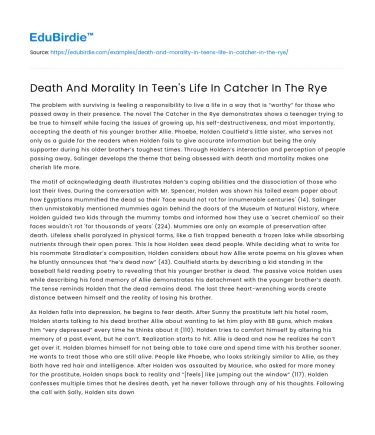The problem with surviving is feeling a responsibility to live a life in a way that is “worthy” for those who passed away in their presence. The novel The Catcher in the Rye demonstrates shows a teenager trying to be true to himself while facing the issues of growing up, his self-destructiveness, and most importantly, accepting the death of his younger brother Allie. Phoebe, Holden Caulfield’s little sister, who serves not only as a guide for the readers when Holden fails to give accurate information but being the only supporter during his older brother’s toughest times. Through Holden’s interaction and perception of people passing away, Salinger develops the theme that being obsessed with death and mortality makes one cherish life more.
The motif of acknowledging death illustrates Holden’s coping abilities and the dissociation of those who lost their lives. During the conversation with Mr. Spencer, Holden was shown his failed exam paper about how Egyptians mummified the dead so their 'face would not rot for innumerable centuries' (14). Salinger then unmistakably mentioned mummies again behind the doors of the Museum of Natural History, where Holden guided two kids through the mummy tombs and informed how they use a 'secret chemical' so their faces wouldn't rot 'for thousands of years' (224). Mummies are only an example of preservation after death. Lifeless shells paralyzed in physical forms, like a fish trapped beneath a frozen lake while absorbing nutrients through their open pores. This is how Holden sees dead people. While deciding what to write for his roommate Stradlater’s composition, Holden considers about how Allie wrote poems on his gloves when he bluntly announces that “he’s dead now” (43). Caulfield starts by describing a kid standing in the baseball field reading poetry to revealing that his younger brother is dead. The passive voice Holden uses while describing his fond memory of Allie demonstrates his detachment with the younger brother’s death. The tense reminds Holden that the dead remains dead. The last three heart-wrenching words create distance between himself and the reality of losing his brother.
Save your time!
We can take care of your essay
- Proper editing and formatting
- Free revision, title page, and bibliography
- Flexible prices and money-back guarantee
As Holden falls into depression, he begins to fear death. After Sunny the prostitute left his hotel room, Holden starts talking to his dead brother Allie about wanting to let him play with BB guns, which makes him “very depressed” every time he thinks about it (110). Holden tries to comfort himself by altering his memory of a past event, but he can’t. Realization starts to hit. Allie is dead and now he realizes he can’t get over it. Holden blames himself for not being able to take care and spend time with his brother sooner. He wants to treat those who are still alive. People like Phoebe, who looks strikingly similar to Allie, as they both have red hair and intelligence. After Holden was assaulted by Maurice, who asked for more money for the prostitute, Holden snaps back to reality and “[feels] like jumping out the window” (117). Holden confesses multiple times that he desires death, yet he never follows through any of his thoughts. Following the call with Sally, Holden sits down on a bench picturing himself dying of pneumonia and remembering how his aunt “kept saying how peaceful” Allie looked during his funeral (171). Holden quickly shifts from the self-regarding thought to thinking about Allie. To Caulfield, death is anything but peaceful. One cannot describe Allie’s death as “peaceful” when Holden punched all the windows and was restrained in a hospital.
Towards the end, he finds meaning in death and realizes he wants to live for someone he cherishes. At Phoebe's room, Holden thinks about James Castle, a classmate who killed himself after he insulted a classmate by calling him conceited at Elkton Hills. He hears James hit the ground and sees the 'teeth and blood' splattered all over the place (188). This is another instance where death has come close to Holden. Then Salinger states explicitly that Mr. Antolini, Holden’s former teacher, carried the body away. While lecturing Holden, Mr. Antolini warns him not to '[die] nobly' for an 'unworthy cause' (207). In this situation, James acted exactly what Mr. Antolini hopes Holden to avoid. But in Holden’s eyes, this is not an unworthy cause. With no chance of fighting back, James decided to jump instead of being “phony” and giving in. Holden may not necessarily agree with Mr. Antolini’s statement, but through this conversation, he now realizes that there exists a meaning behind a person’s death. In front of the museum’s doorsteps, Holden changes his mind of escaping to comfort his crying little sister Phoebe by saying “I’m not going away anywhere” (228). Holden decides that he will stay in this world, no longer thinking about ways to self-destruct and finally notices a distinction between Allie and Phoebe. Allie is dead and Phoebe is not. At this moment he can still live for Phoebe, his one and only emotional anchor.
The book The Catcher in the Rye shows how the troubled Holden improves through the struggles of coping with the death of Allie and be able to learn how to stand on one’s own two feet. When a loved one dies, a special connection remains. People talk about them and reminisce about the times spent together. Even when the person has passed away, this connection does not have to be given up to move forward in life.
Work Cited
- Salinger, J. D. The Catcher in the Rye. Little Brown, 2014.






 Stuck on your essay?
Stuck on your essay?

